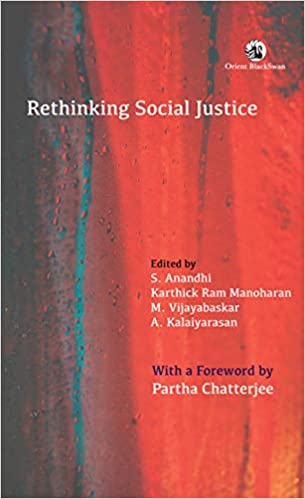Rethinking Social Justice was published earlier this year in honour of MSS Pandian, the late historian of South India. The volume comprises an array of essays on a wide range of topics that are thematically organized into five sections: ‘Politics of Culture and Identity’, ‘Critical Social History’, ‘Nation and Region’, ‘Political Economy’ and ‘Cinema and Society’. The thematic organization of the book is representative of the range of Pandian’s intellectual interests: the political and social history of Tamil Nadu, caste and agrarian politics, the intimate nexus between cinema and politics in Tamil Nadu and so on. Some of the essays are co-authored by Pandian himself. The main challenge before the reviewer of such a rich and diverse volume is doing justice to unfamiliar terrains of scholarship. As a scholar of modern Tamil literature, reading the book expanded my own knowledge of the nuances of Tamil politics and culture. For the purposes of this review, I provide a broad overview of some of the essays of the book and pose questions that bear significance to some of the essays.
S Anandhi’s reading of Muthulakshmi Reddy’s autobiography in two volumes that document her life as the first female medical graduate from Madras Presidency and the first woman to be elected as a member of the Legislative Council in British India. Reddy argued for the public participation of women in national life and demanded that their private lives as mothers and wives become matters of social and political concern. Her attempt to blur the public-private binary was only directed to the lives of ‘respectable, educated working women’, a generic category for Reddy, which excluded those who were marked by caste, class and sexuality. However, there is nothing in the essay to substantiate Reddy’s desire to blur the distinction between the public and the private. Did Reddy consider the possibility of providing institutional support to mothers and wives who also led political lives? Secondly, if the private lives of women had to become part of the public sphere, it is only natural that men participate in domesticity and childrearing, a possibility Reddy does not seem to address. Thirdly, how would the presence of women who are excluded from her notion of respectability, challenge the public-private dichotomy?

